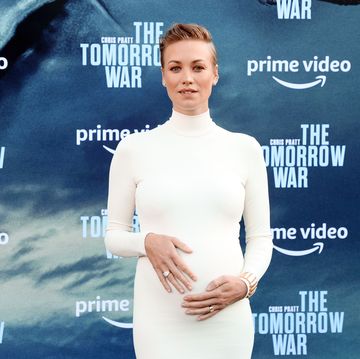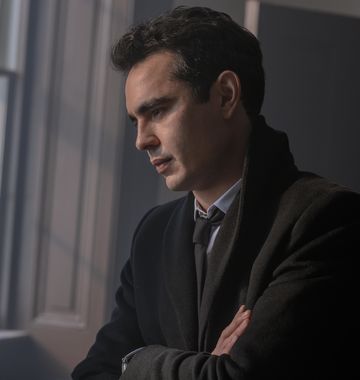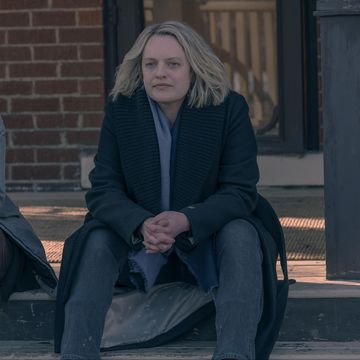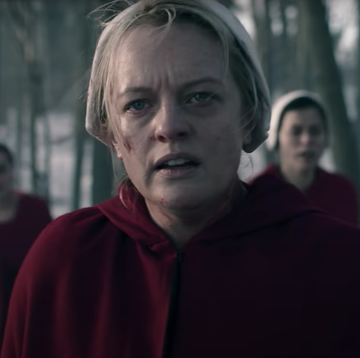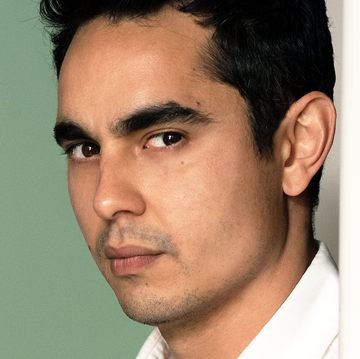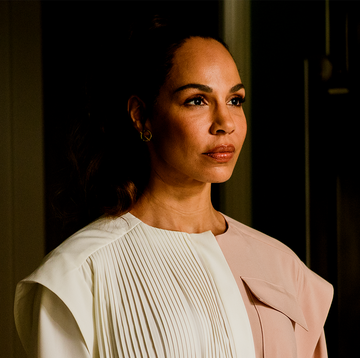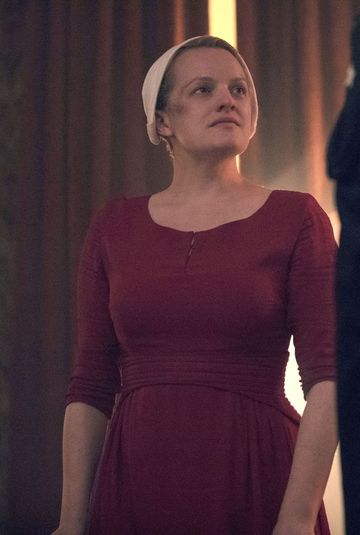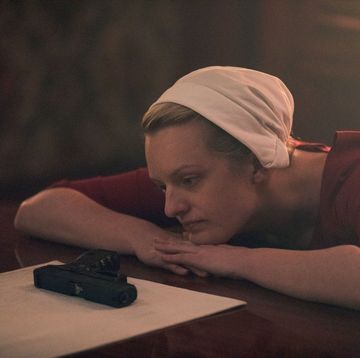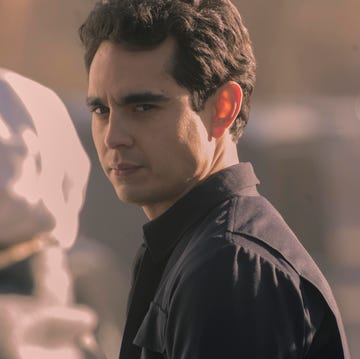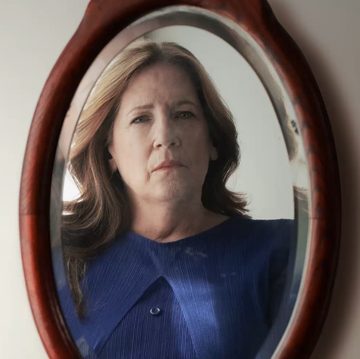Viewers of The Handmaid’s Tale bracing themselves to endure more of the show's emotionally demanding drama can relax. The first few episodes of Season 3, as if sensing that reality is hewing too close to the show's dystopian vision of the world, trades its depictions of emotional and physical torment for a tone of empowerment and rebellion. It’s almost as if an awakening has hit Gilead—more and more, its citizens are acknowledging the intrinsic fault lines within the regime, with only the deadly consequences of rebellion ensuring superficial obedience. It’s the perfect environment for June (Elisabeth Moss) to foster the Resistance. In the opening moments of Episode 4, she surveys her neighbors: "Who among them can be persuaded?" she thinks. "Who can be turned, ignited, to burn this shit place to the ground?"
But as Moss slips off her heels amid a tangle of video equipment in a room at The Beekman Hotel in lower Manhattan, she maintains that the fight to free Gilead has always been much bigger than the facile dichotomy of good versus evil. “I was looking forward to doing something with this character that is much more complicated than coming in, putting on a red costume, and raising a banner,” she says. “That's a very pretty way to do things. It would be lovely if we could all lead the Resistance like that, but it's a lot harder."
The first four episodes of The Handmaid's Tale's third season sees June's early attempts to generate discord: Trying (and failing) to move Marthas through Gilead in aid of the rebels, appealing to the humanity of the inscrutable Commander Lawrence (Bradley Whitford), and attempting once more to provoke Serena Joy (Yvonne Strahovski) into demanding agency. Moss teases an escalation in June's manipulations: “She realizes that she has to be more ruthless than they are. She has to be more cruel. She has to be willing to do anything to anyone that gets in her way. She has to almost become one of them, in order to beat them at their own game. That might be what the true leader of a Resistance needs to be.”
In the final moments of the fourth episode, June receives tangible proof of her daughter's safety in the form of video footage of baby Nichole strapped to Luke's (O. T. Fagbenle) chest, shot at a protest against the Gilead regime in Canada. This revelation will have seismic consequences for June, the Waterfords, and Gilead as a whole in forthcoming episodes. June’s reaction will surprise even herself, Moss adds. "The thing that June realizes through much pain and sorrow is the change that happens in her," Moss reveals, choosing her words carefully to tiptoe around the spoiler minefield. “It's partially what this world has done to her. She's not that person in the flashbacks anymore. She's had things done to her that she'll never be able to take back.”
Below, Moss talks to BAZAAR.com about that Episode 4 cliffhanger, the complicated relationship between June and Commander Lawrence, and what it means to her to see the Handmaids’ robes become a symbol of resistance in the real world.
Harper's BAZAAR: Can you walk through June's head space at the end of Episode 4, after she sees the video of Nichole?
Elisabeth Moss: There's so many things June tries to be strong about and I love those moments when something breaks her. I love that she tries to keep it together and not let Serena and Fred see it. And then as soon as she leaves, she loses it. It just reveals how human she is, that she can be strong, she can be ruthless, she can be cruel, she can be a leader, she can be all of these things, a bad ass—but she's very human. The fact that not only did she get her baby out, but her baby got to Luke, and seeing them together and they look happy and healthy, that just wipes out everything else. It gives her so much more strength to continue her fight.
HB: The consequences of June’s decision to stay in Gilead reverberate through the entirety of Season 3. Was it something you were okay with? Was it something you had to wrestle with on a personal level?
EM: If I wasn't okay with it we wouldn't have done it, because I have such a strong connection to June as a character that my collaborators are really good about listening to what I think June would do or should do and trusting me in that—which is amazing and doesn’t always happen that way.
I loved it. I don't think she had a choice. I think she couldn't leave her daughter. Sure, she could go to Canada and fight from the outside and protest and do the work they're doing there, but they are doing that work. She's one of the only people who can fight from the inside. She's one of the only people who can infiltrate the inside.
At the end of that episode, I don't think she knows she’s not gonna get in that truck. When she makes that decision, it’s because she's just seen this Commander, who is apparently working for the Resistance, getting Emily out. This high-ranking Commander is on our side. That's the thing that tips it over. That's the thing that makes her stay.
Harper’s BAZAAR: And we get to see this magnetic dynamic play out between them. We know what drives June at this point, but Commander Lawrence is an enigma, and watching her feel him out is a lot of fun. Can you speak to their relationship?
EM: I think she knows how to deal with so many characters on the show, but Commander Lawrence throws her at first. She doesn't know if he's on the right side or not. She first thinks he's going to be a good person, because he got Emily out, and she just doesn't understand, wait, why doesn't he want to help her now? The things she's used to get people on her side before don't work with him. She has to use her intellect, that what he respects the most is her intelligence. Once she realizes that, she can actually start to get to him. They have the most interesting relationship on the show for June this year. They have this parallel path they go on, and you're never quite sure until very late in the game whether or not he's a good guy. I don't think June is sure either, but she realizes it doesn't matter. She realizes the most important thing is that she get him to work for her and get him on her side. It doesn't matter whether or not he's a good person.
HB: It’s fascinating to watch June tease out the nuances of people within the Gilead machine. Everything is supposed to be either right or wrong, yet June forces everyone she comes into contact with to rethink their own positions. First Serena Joy, and now Commander Lawrence.
EM: He challenges her. He challenges her ideas of the black-and-whiteness of this world. He reveals there are gray areas and that maybe things are not as simple as she thought they were. Things are not as easy as she thought the Resistance was going to be.
HB: There’s a scene in the premiere where June sneaks into the McKenzies’ home to try to get Hannah. She’s foiled, but what I found shocking is Mrs. McKenzie actually entertains June. She hears her out and treats her like an equal, which is not something Wives are supposed to do in Gilead. I’m curious if that’s symptomatic of a wider resistance to the laws of Gilead, or June’s individual powers of persuasion.
EM: Any group is made up of individuals, right? So there's gonna be people in that group who are not as bad as the other ones, or have good intentions. I don't think Mrs. McKenzie is an evil person. She's caught up in this regime. I think one of June's superpowers is the ability to believe that ultimately, somebody will be a good person. It gets her into trouble when she turns out to be wrong. I think that the powers that be are generally going to be on the one side of things, but there are people in Gilead that aren't necessarily the most evil. There are people that are human and June's trying to find those people.
HB: The Handmaid's robes have become a symbol of resistance across the U.S., with people wearing them in Washington, D.C. and courthouses across the country to protest laws restricting women's rights. What is your reaction to that?
EM: I think it's an incredible honor, honestly. I feel like those are the women that are actually doing the work. Those are the women that are on the front lines. I consider it an honor to put on that costume alongside them and to stand for something. They're the ones who are out there really changing things, or trying to. I find them incredibly inspiring. It only makes me even more proud to put that costume on and to stand for that.
Photography: Tyler Joe; Art Director: Perri Tomkiewicz; Visual Producer: Suze Lee; Director of Photography: Robert Dumé; Producer: Kathryn Rice; Gaffer: John Komar; Production Assistant: Whitt Sellers





